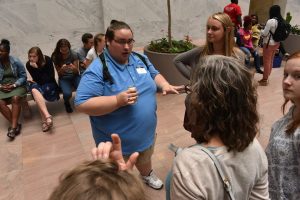By Whylie Cook, ELCA Advocacy 2018 Summer Intern
Last month, we had the incredible opportunity to present about our advocacy work to a group of 50 high school youth from Wisconsin. Having spent nearly my entire life in Wisconsin, it was refreshing to connect with engaged youth that were energized to work for change in their communities.
While our presentation primarily focused on the farm bill and touched a bit on immigration and ELCA AMMPARO, I was extremely overjoyed when we turned to action by writing letters to our congressional leaders. These young people asked intelligent and passionate questions about what it means to live out our faith and love our neighbor. They took advocacy seriously and saw that they can make their voices heard in world that often speaks for them.
A couple of days later while attending a World Refugee Day event in the Senate building, we just so happened to run into the same group again. We decided to take a couple of minutes to help them unpack and debrief about their meetings with their legislators. The group had a successful meeting as well as one that was challenging. I was overjoyed when they were able to name hurtful rhetoric and realize that they were not being heard or taken seriously. They countered the “myths of poverty” with facts and spoke truth to power in love, ushering a compassionate response to poverty based on their faith which calls them to care for their neighbor. Although they felt put down, they were not defeated. In our debrief, I emphasized perseverance in holding our elected officials accountable. Calling state offices, calling national offices, and telling other constituents about their experience is an important part of holding elected officials to the people they serve.
This whole experience reminded me of the greeting among the Masai tribe in Africa, “Kasserian Ingera,” meaning “And how are the children?” These young people reminded me of how all to often, we dismiss the voices of our youth. We tell them that they can’t vote so they should not speak on issues of public policy or we dismiss them because of their age. We tell them that they have no place in our national debates which at the end of the day, immensely affect them. Our youth cry out for the longing to feel safe from gun and police violence in schools and their communities, and are instead met with not only silence, but also those who invalidate their violence and pain. How are the children? 15 million children live in poverty the United States. Instead caring for them, we cut social services, we cut affordable housing, and we debate whether or not poor children should have a right to live through health insurance. How are the children? Children are separated from their families and portrayed as criminal through our rhetoric. How are the children?
While adults often clamor about public policy, we sometimes forget to listen to the children. But the call of the Gospel is clear: 14 but Jesus said, “Let the little children come to me, and do not stop them; for it is to such as these that the kingdom of heaven belongs” (Matthew 19:14). Our faith calls us to listen to the children because they are chosen and loved by God, vulnerable, and are our future. We must listen to Jesus who speaks through the children at our border. We must listen to Jesus who speaks to elected officials through young adults who call for us to feed the hungry, provide for the poor, and care for our neighbor. We must listen to our children who work toward justice and peace, refusing to let the darkness consume the light and love of God. We must listen to our children who fear violence when going to school or walking down the street. We must listen to our children who don’t have clean water to drink and clean air to breath.
In the Gospel according to Matthew Jesus commits us to “take care that you do not despise one of these little ones; for, I tell you, in heaven their angels continually see the face of my Father in heaven” (Matthew 18:10). It is through these vulnerable children whom God reveals God’s intending for a world where justice, love, and grace abide. May we always ask “how are the children”, listen to our children, and advocate for our children. May it be so.

